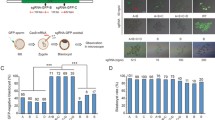Abstract
Gene editing in model organisms has provided critical insights into brain development and diseases. Here, we report the generation of a cynomolgus monkey (Macaca fascicularis) carrying MECP2 mutations using transcription activator-like effector nucleases (TALENs)-mediated gene targeting. After injecting TALENs mRNA into monkey zygotes achieved by in vitro fertilization and embryo transplantation into surrogate monkeys, we obtained one male newborn monkey with an MECP2 deletion caused by frameshifting mutation in various tissues. The monkey carrying the MECP2 mutation failed to survive after birth, due to either the toxicity of TALENs or the critical requirement of MECP2 for neural development. The level of MeCP2 protein was essentially depleted in the monkey’s brain. This study demonstrates the feasibility of introducing genetic mutations in non-human primates by site-specific gene-editing methods.
Similar content being viewed by others
References
Nestler EJ, Hyman SE. Animal models of neuropsychiatric disorders. Nat Neurosci 2010, 13: 1161–1169.
Tesson L, Usal C, Menoret S, Leung E, Niles BJ, Remy S, et al. Knockout rats generated by embryo microinjection of TALENs. Nat Biotechnol 2011, 29: 695–696.
Huang P, Xiao A, Zhou MG, Zhu ZY, Lin S, Zhang B. Heritable gene targeting in zebrafish using customized TALENs. Nat Biotechnol 2011, 29: 699–700.
Sung YH, Baek IJ, Kim DH, Jeon J, Lee J, Lee K, et al. Knockout mice created by TALEN-mediated gene targeting. Nat Biotechnol 2013, 31: 23–24.
Yang H, Wang HY, Shivalila CS, Cheng AW, Shi LY, Jaenisch R. One-step generation of mice carrying reporter and conditional alleles by CRISPR/Cas-mediated genome engineering. Cell 2013, 154: 1370–1379.
Li DL, Qiu ZW, Shao YJ, Chen YT, Guan YT, Liu MZ, et al. Heritable gene targeting in the mouse and rat using a CRISPR-Cas system. Nat Biotechnol 2013, 31: 681–683.
Wang HY, Yang H, Shivalila CS, Dawlaty MM, Cheng AW, Zhang F, et al. One-step generation of mice carrying mutations in multiple genes by CRISPR/Cas-mediated genome engineering. Cell 2013, 153: 910–918.
Liu H, Chen Y, Niu Y, Zhang K, Kang Y, Ge W, et al. TALENmediated gene mutagenesis in rhesus and cynomolgus monkeys. Cell Stem Cell 2014, 14: 323–328.
Niu Y, Shen B, Cui Y, Chen Y, Wang J, Wang L, et al. Generation of gene-modified cynomolgus monkey via Cas9/RNA-Mediated gene targeting in one-cell embryos. Cell 2014, 156: 836–843.
Nan XS, Campoy FJ, Bird A. MeCP2 is a transcriptional repressor with abundant binding sites in genomic chromatin. Cell 1997, 88: 471–481.
Amir RE, Van den Veyver IB, Wan M, Tran CQ, Francke U, Zoghbi HY. Rett syndrome is caused by mutations in X-linked MECP2, encoding methyl-CpG-binding protein 2. Nature Genetics 1999, 23: 185–188.
Chen W G, Chang Q, Lin Y, Meissner A, West AE, Griffith EC, et al. Derepression of BDNF transcription involves calcium-dependent phosphorylation of MeCP2. Science 2003, 302: 885–889.
Martinowich K, Hattori D, Wu H, Fouse S, He F, Hu Y, et al. DNA methylation-related chromatin remodeling in activitydependent BDNF gene regulation. Science 2003, 302: 890–893.
Cheng T L, Wang Z, Liao Q, Zhu Y, Zhou WH, Xu W, et al. MeCP2 suppresses nuclear microRNA processing and dendritic growth by regulating the DGCR8/Drosha complex. Dev Cell 2014, 28: 547–560.
Chen RZ, Akbarian S, Tudor M, Jaenisch R. Deficiency of methyl-CpG binding protein-2 in CNS neurons results in a Rett-like phenotype in mice. Nat Genetics 2001, 27: 327–331.
Guy J, Hendrich B, Holmes M, Martin JE, Bird A. A mouse Mecp2-null mutation causes neurological symptoms that mimic Rett syndrome. Nat Genetics 2001, 27: 322–326.
Chan AWS, Yang SH. Generation of transgenic monkeys with human inherited genetic disease. Methods 2009, 49: 78–84.
Sun Q, Dong J, Yang WT, Jin YJ, Yang MY, Wang Y, et al. Efficient reproduction of cynomolgus monkey using pronuclear embryo transfer technique. Proc Natl Acad Sci U S A 2008, 105: 12956–12960.
Author information
Authors and Affiliations
Corresponding authors
Additional information
These authors contributed equally to this work.
Rights and permissions
About this article
Cite this article
Liu, Z., Zhou, X., Zhu, Y. et al. Generation of a monkey with MECP2 mutations by TALEN-based gene targeting. Neurosci. Bull. 30, 381–386 (2014). https://doi.org/10.1007/s12264-014-1434-8
Received:
Accepted:
Published:
Issue Date:
DOI: https://doi.org/10.1007/s12264-014-1434-8




